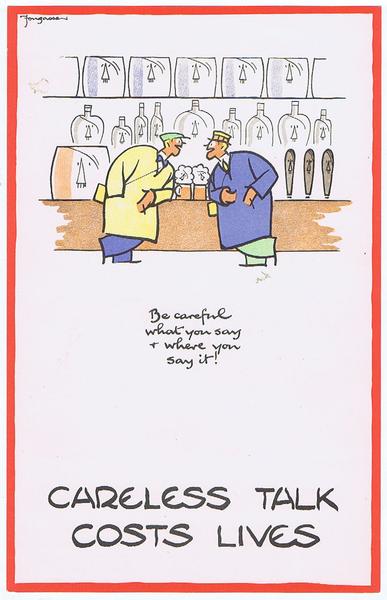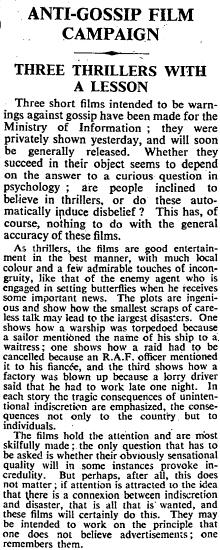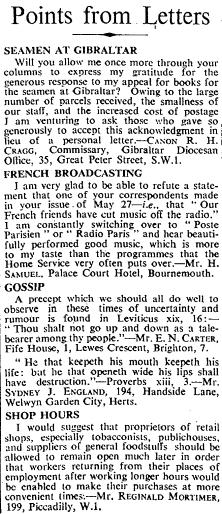Tags
agatha christie, all hands, anti-gossip, antigossip, bbc, careless talk costs lives, Churchill, cinema, dangerous comment, films, fougasse, gossip, john mills, keep mum, lord reith, ministry of information, now you're talking, propaganda, second world war, somerset maugham, World War Two, ww2
“Careless Talk Costs Lives” and “Keep Mum, She’s Not So Dumb”: phrases that have become commonplace in British culture since they were created in World War Two, to remind British citizens of the importance of not leaking secrets – even inadvertently – to Britain’s enemies. Appearing on a celebrated series of posters, they formed part of a wide-ranging anti-gossip campaign, which the British Government ran throughout the war. A once-secret cabinet paper from 1940, authored by Sir John (later Lord) Reith, who was then Minister of Information, provides fascinating insights into this campaign, bringing to light several initiatives which, unlike the famous slogans, have been all but forgotten today.

The “Careless Talk” series was drawn by Fougasse and proved hugely popular because of its wit and light-hearted style.

Fougasse was the pen name of Cyril Bird. He worked for free on the artwork for the Ministry of Information; his main job at the time was as art editor of Punch magazine.

The most iconic “Keep Mum” poster was designed by Gerald Lacoste in 1942. Aimed at officers’ messes, it had, according to one journalist, “sex appeal”.
In the rest of this post, I reproduce Reith’s briefing in full, providing links to the initiatives he wrote about (where I have been able to find them). In some cases I have drawn a blank and here I would love to hear from anyone who has their own information to share. In particular, I would really love to read the anti-gossip stories that Reith says he commissioned from Agatha Christie, Somerset Maugham and E. M. Delafield. I can’t help hoping that Christie’s might be called something like Murmurs on the Orient Express!
SECRET
WAR CABINET
13th March 1940
COMMITTEE ON ISSUE OF WARNINGS AGAINST DISCUSSION OF CONFIDENTIAL MATTERS IN PUBLIC PLACES
NOTE BY THE MINISTER OF INFORMATION
In accordance with Conclusion 13(iii) War Cabinet Meeting No. 84 of 15th November 1939, I circulate for the information of the War Cabinet a brief report on the action so far taken. J[ohn]. C[harles]. W[alsham]. R[eith]
ANTI GOSSIP
1. POSTERS
(a) Printing: 2,250,100 posters, varying in size […], have already been printed. The most important numerically are the “Official Warning” (1,242,500) and the Fougasse series (734,200). A reprint order has been placed for 453,500, including 248,000 of the latter.
(b) Distribution: Over 1,500,000 have already been posted in voluntary sites. Requests are coming in daily, particularly for the Fougasse series.
(c) Future designs: The production of new posters is under consideration, but the present designs are so much in demand that it may not be necessary to incur more expenditure yet.
2. PRESS CONFERENCE
A Press Conference was held on February 1st, 1940, under the chairmanship of the Director General [Sir Kenneth Lee] of the Ministry of Information. An excellent press resulted and copies of the posters were reprinted in practically every national daily paper, in many of the provincials, and in two American papers.
The D[irector]. of I[intelligence]., Air Ministry, spoke to the Press on March 7th; and it is hoped that the DMI [Director of Military Intelligence], Admiralty and the DMI, War Office will do likewise. It is proposed to draw particular attention at such Press Conferences to the danger of leakage through the conversation of journalists.
3. FILM PUBLICITY
Three ten-minute Anti-Gossip Films [All Hands, Dangerous Comment and Now You’re Talking] are in course of production at the Ealing Studios and will be released at fortnightly intervals, beginning about 22nd March. They will be distributed by Metro-Goldwyn-Mayer by agreement with the trade, and each film is expected to cover at least 2,000 cinemas.

All Hands starred a young John Mills, who carelessly tells his sweetheart when his ship is sailing. The manageress of the cafe they are in, who is a German spy, gets to hear of it and Mills’s ship is sunk.

A review of the three films from The Times of 21 March 1940: ‘they may be intended to work on the principle that one does not believe advertisements; one remembers them.’
4. CO-OPERATION WITH THE BBC
(a) Ten Anti-Gossip talks have already been given by the BBC.
(b) Five-minute talks will be included at irregular intervals in the new “Post-Script” series, following the nine o’clock news. The first of these was given on 5th March.
5. PUBLIC MEETINGS
Public speakers are being asked to mention the Anti-Gossip Campaign whenever possible.
6. WRITERS
Various well-known writers, including Somerset Maugham, Agatha Christie and E. M. Delafield are being asked to supply articles or stories on the results of careless talk.
7. ANTI-GOSSIP TALKS TO THE SERVICES
Warning lectures have been given to officers and men in all three Services and also to women’s organisations attached to those Services. A special anti-gossip pamphlet of an informal nature is being prepared for distribution to all units stationed in this country.
The Services are being asked to continue regular talks and to give frequent warnings against careless talking. There is evidence that these are having a good effect in the Army.
8. PREVENTING GOSSIP IN PUBLIC HOUSES
The Brewers’ Society are co-operating with the Ministry of Information by writing to the licensees of all public houses asking them to warn their customers against indiscreet gossiping.
9. LETTERS TO THE PRESS
Certain responsible people are being encouraged to write to the Press giving instances of the dangers of gossip (for example, the letter signed ‘Michael Hamilton’ in the ‘Daily Telegraph’ of 2nd March.)


FYI – the rather un-glamourous (and brief) part of the German Ship Captain in “All Hands” was played by my late Grandfather the German-Jewish émigré Carl Jaffé in one of his earlier film roles… eagle eyed followers will also recognise him 28 years later (we’ll skip the +50 films/+40 TV shows/25-years BBC Head of World Service; German Section in the interim) as the Polish Officer Captain Winogrodzki in an episode of Dad’s Army…
THANK YOU SO MUCH
Hi Hauata; thank you I’m glad you liked my comment… if I may ask: what is your interest in the subject…?
You can now watch “All Hands” FREE on the BFI website: www.http://player.bfi.org.uk/film/watch-all-hands-1940/
Pingback: You are You! – LSE – Media Study Students